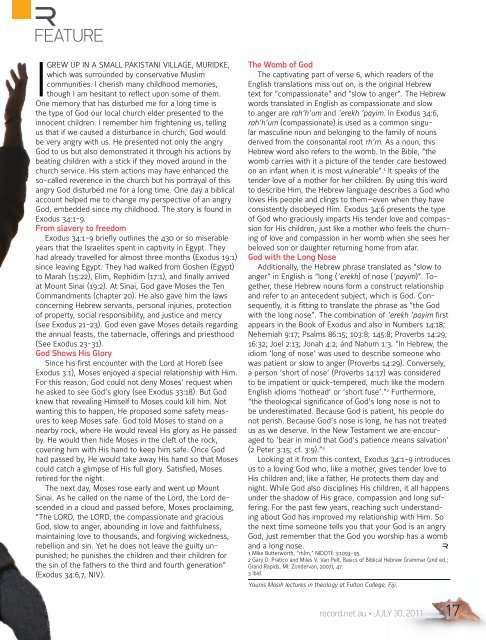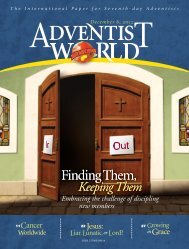Download - RECORD.net.au
Download - RECORD.net.au
Download - RECORD.net.au
- No tags were found...
Create successful ePaper yourself
Turn your PDF publications into a flip-book with our unique Google optimized e-Paper software.
FEATUREIgrew up in a small Pakistani village, Muridke,which was surrounded by conservative Muslimcommunities. I cherish many childhood memories,though I am hesitant to reflect upon some of them.One memory that has disturbed me for a long time isthe type of God our local church elder presented to theinnocent children. I remember him frightening us, tellingus that if we c<strong>au</strong>sed a disturbance in church, God wouldbe very angry with us. He presented not only the angryGod to us but also demonstrated it through his actions bybeating children with a stick if they moved around in thechurch service. His stern actions may have enhanced theso-called reverence in the church but his portrayal of thisangry God disturbed me for a long time. One day a biblicalaccount helped me to change my perspective of an angryGod, embedded since my childhood. The story is found inExodus 34:1-9.From slavery to freedomExodus 34:1-9 briefly outlines the 430 or so miserableyears that the Israelites spent in captivity in Egypt. Theyhad already travelled for almost three months (Exodus 19:1)since leaving Egypt. They had walked from Goshen (Egypt)to Marah (15:22), Elim, Rephidim (17:1), and finally arrivedat Mount Sinai (19:2). At Sinai, God gave Moses the TenCommandments (chapter 20). He also gave him the lawsconcerning Hebrew servants, personal injuries, protectionof property, social responsibility, and justice and mercy(see Exodus 21-23). God even gave Moses details regardingthe annual feasts, the tabernacle, offerings and priesthood(See Exodus 23-31).God Shows His GlorySince his first encounter with the Lord at Horeb (seeExodus 3:1), Moses enjoyed a special relationship with Him.For this reason, God could not deny Moses’ request whenhe asked to see God’s glory (see Exodus 33:18). But Godknew that revealing Himself to Moses could kill him. Notwanting this to happen, He proposed some safety measuresto keep Moses safe. God told Moses to stand on anearby rock, where He would reveal His glory as He passedby. He would then hide Moses in the cleft of the rock,covering him with His hand to keep him safe. Once Godhad passed by, He would take away His hand so that Mosescould catch a glimpse of His full glory. Satisfied, Mosesretired for the night.The next day, Moses rose early and went up MountSinai. As he called on the name of the Lord, the Lord descendedin a cloud and passed before, Moses proclaiming,“The LORD, the LORD, the compassionate and graciousGod, slow to anger, abounding in love and faithfulness,maintaining love to thousands, and forgiving wickedness,rebellion and sin. Yet he does not leave the guilty unpunished;he punishes the children and their children forthe sin of the fathers to the third and fourth generation”(Exodus 34:6,7, NIV).The Womb of GodThe captivating part of verse 6, which readers of theEnglish translations miss out on, is the original Hebrewtext for “compassionate” and “slow to anger”. The Hebrewwords translated in English as compassionate and slowto anger are rah’h’um and ’erekh ’payim. In Exodus 34:6,rah’h’um (compassionate) is used as a common singularmasculine noun and belonging to the family of nounsderived from the consonantal root rh’m. As a noun, thisHebrew word also refers to the womb. In the Bible, “thewomb carries with it a picture of the tender care bestowedon an infant when it is most vulnerable”. 1 It speaks of thetender love of a mother for her children. By using this wordto describe Him, the Hebrew language describes a God wholoves His people and clings to them—even when they haveconsistently disobeyed Him. Exodus 34:6 presents the typeof God who graciously imparts His tender love and compassionfor His children, just like a mother who feels the churningof love and compassion in her womb when she sees herbeloved son or d<strong>au</strong>ghter returning home from afar.God with the Long NoseAdditionally, the Hebrew phrase translated as “slow toanger” in English is “long (’erekh) of nose (’payim)”. Together,these Hebrew nouns form a construct relationshipand refer to an antecedent subject, which is God. Consequently,it is fitting to translate the phrase as “the Godwith the long nose”. The combination of ’erekh ’payim firstappears in the Book of Exodus and also in Numbers 14:18;Nehemiah 9:17; Psalms 86:15; 103:8; 145:8; Proverbs 14:29;16:32; Joel 2:13; Jonah 4:2; and Nahum 1:3. “In Hebrew, theidiom ‘long of nose’ was used to describe someone whowas patient or slow to anger (Proverbs 14:29). Conversely,a person ‘short of nose’ (Proverbs 14:17) was consideredto be impatient or quick-tempered, much like the modernEnglish idioms ‘hothead’ or ‘short fuse’.” 2 Furthermore,“the theological significance of God’s long nose is not tobe underestimated. Bec<strong>au</strong>se God is patient, his people donot perish. Bec<strong>au</strong>se God’s nose is long, he has not treatedus as we deserve. In the New Testament we are encouragedto ‘bear in mind that God’s patience means salvation’(2 Peter 3:15; cf. 3:9).” 3Looking at it from this context, Exodus 34:1-9 introducesus to a loving God who, like a mother, gives tender love toHis children and, like a father, He protects them day andnight. While God also disciplines His children, it all happensunder the shadow of His grace, compassion and long suffering.For the past few years, reaching such understandingabout God has improved my relationship with Him. Sothe next time someone tells you that your God is an angryGod, just remember that the God you worship has a womband a long nose.1 Mike Butterworth, “rh(m,” NIDOTE 3:1093–95.2 Gary D. Pratico and Miles V. Van Pelt, Basics of Biblical Hebrew Grammar (2nd ed.;Grand Rapids, MI: Zondervan, 2007), 47.3 Ibid.Younis Masih lectures in theology at Fulton College, Fiji.record.<strong>net</strong>.<strong>au</strong> • JULY 30, 2011 17
















